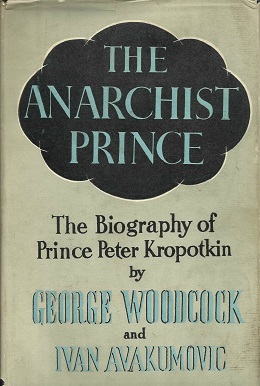Anarchist communism is a political philosophy and anarchist school of thought that advocates communism. It calls for the abolition of private property but retention of personal property and collectively-owned items, goods, and services. It supports social ownership of property and the distribution of resources "From each according to his ability, to each according to his needs".

Pyotr Alexeyevich Kropotkin (1842–1921) was a Russian anarchist and geographer known as a proponent of anarchist communism.
Green anarchism, also known as ecological anarchism or eco-anarchism, is an anarchist school of thought that focuses on ecology and environmental issues. It is an anti-capitalist and anti-authoritarian form of radical environmentalism, which emphasises social organization, freedom and self-fulfillment.
Anarchists have employed certain symbols for their cause, including most prominently the circle-A and the black flag. Anarchist cultural symbols have been prevalent in popular culture since around the turn of the 21st century, concurrent with the anti-globalization movement. The punk subculture has also had a close association with anarchist symbolism.

Charlotte Mary Wilson was an English Fabian and anarchist who co-founded Freedom newspaper in 1886 with Peter Kropotkin, and edited, published, and largely financed it during its first decade. She remained editor of Freedom until 1895.

The Politics of Individualism: Liberalism, Liberal Feminism, and Anarchism is a 1993 political science book by L. Susan Brown. She begins by noting that liberalism and anarchism seem at times to share common components, but on other occasions are in direct opposition to one another. She argues that what they have in common is "existential individualism", the belief in freedom for freedom's sake. However, she notes that in liberal works there exists also an "instrumental individualism", by which she means freedom to satisfy individual interests. Brown argues that the latter annihilates the intentions of the former because it allows individuals the "freedom" to disrupt the freedom of other individuals in its aim of achieving individual goals. On the other hand, instrumental individualism requires some degree of existential individualism to sustain itself.
Anarchism is generally defined as the political philosophy which holds the state to be undesirable, unnecessary and harmful as well as opposing authority and hierarchical organization in the conduct of human relations. Proponents of anarchism, known as anarchists, advocate stateless societies based on non-hierarchical voluntary associations. While anarchism holds the state to be undesirable, unnecessary and harmful, opposition to the state is not its central or sole definition. Anarchism can entail opposing authority or hierarchy in the conduct of all human relations.

Nationalism and Culture is a nonfiction book by German anarcho-syndicalist writer Rudolf Rocker. In this book, he criticizes religion, statism, nationalism, and centralism from an anarchist perspective.
Egoist anarchism or anarcho-egoism, often shortened as simply egoism, is a school of anarchist thought that originated in the philosophy of Max Stirner, a 19th-century philosopher whose "name appears with familiar regularity in historically orientated surveys of anarchist thought as one of the earliest and best known exponents of individualist anarchism".

Pierre-Joseph Proudhon was a French socialist, politician, philosopher, and economist who founded mutualist philosophy and is considered by many to be the "father of anarchism". He was the first person to declare himself an anarchist, using that term, and is widely regarded as one of anarchism's most influential theorists. Proudhon became a member of the French Parliament after the Revolution of 1848, whereafter he referred to himself as a federalist. Proudhon described the liberty he pursued as "the synthesis of community and property". Some consider his mutualism to be part of individualist anarchism while others regard it to be part of social anarchism.

Maria Isidorovna Goldsmith, also known as Marie Goldsmith, was a Russian Jewish anarchist and collaborator of Peter Kropotkin. She also wrote under the pseudonyms Maria Isidine and Maria Korn.

The Anarchist Prince is a biography of Peter Kropotkin by George Woodcock and Ivan Avakumović.
A Short History of Anarchism is a history of anarchism by Max Nettlau.

Anarchist Portraits is a 1988 history book by Paul Avrich about the lives and personalities of multiple prominent and inconspicuous anarchists.

Pierre-Joseph Proudhon is a biography of the French anarchist written by George Woodcock and first published in 1956 by Macmillan.
Fields, Factories, and Workshops is an 1899 book by anarchist Peter Kropotkin that discusses the decentralization of industries, possibilities of agriculture, and uses of small industries. Before this book on economics, Kropotkin had been known for his militant activity in behalf of international anarchism and writings on Siberian geography. Through the book, he sought to connect anarchism with science, based on sociological tendencies. The book was compiled from essays he had published in Nineteenth Century and Forum between 1888 and 1890. The book was first published in 1899 by Houghton-Mifflin (Boston) and Hutchinson (London) to favorable reviews among Britons. It has since been republished in multiple editions: Swan Sonnenschein (London) and Putnam in 1901, 1904, 1907, 1909, and Nelson (London) and Putnam in 1913 and 1919. Reproductions of the first and second editions appeared in 1968. A later edition, edited by Colin Ward for Harper & Row, released in 1974 with more contemporary illustrations as Fields, Factories and Workshops Tomorrow.

Memoirs of a Revolutionist is Peter Kropotkin's autobiography and his most famous work.
Ronald Creagh was a French sociologist and anarchist best known for his books on American intentional communities. He was a professor of American civilization in Montpellier. Creagh died in September 2023 at the age of 94.
The Libertarian Book Club and Libertarian League were two postwar anarchist groups in New York City associated with Sam and Esther Dolgoff.










